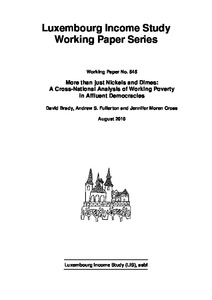More than just nickels and dimes: a cross-national analysis of working poverty in affluent democracies
"Despite its centrality to contemporary inequality, working poverty is often popularly discussed but rarely studied by sociologists. Using the Luxembourg Income Study, we analyze whether an individual is working poor across 18 affluent democracies circa 2000. We demonstrate that working poverty...
| Main Authors: | , , |
|---|---|
| Institution: | ETUI-European Trade Union Institute |
| Format: | TEXT |
| Language: | English |
| Published: |
Luxembourg
2010
LIS |
| Subjects: | |
| Online Access: | https://www.labourline.org/KENTIKA-19183641124919018239-More-than-just-nickels-and-dim.htm |
| Summary: | "Despite its centrality to contemporary inequality, working poverty is often popularly discussed but rarely studied by sociologists. Using the Luxembourg Income Study, we analyze whether an individual is working poor across 18 affluent democracies circa 2000. We demonstrate that working poverty does not simply mirror overall poverty and that there is greater cross-national variation in working than overall poverty. We then examine four explanations for working poverty: demographic characteristics, economic performance, unified theory, and welfare generosity. We utilize Heckman probit models to jointly model the likelihood of employment and poverty among the employed. Our analyses provide the least support for the economic performance explanation. There is modest support for unified theory as unionization reduces working poverty in some models. However, most of these effects appear to be mediated by welfare generosity. More substantial evidence exists for the demographic characteristics and welfare generosity explanations. An individual?s likelihood of being working poor can be explained by a) a lack of multiple earners or other adults in one?s household, low education, gle motherhood, having children and youth; and b) the generosity of the welfare state in which he or she resides. Also, welfare generosity does not undermine employment and reduces working poverty even among demographically vulnerable groups. Ultimately, we encourage a greater role for the welfare state in debates about working poverty." |
|---|---|
| Physical Description: | 44 p. Digital |

